
Candida Martinelli's Italophile Site

Main
Page This family-friendly site celebrates Italian culture for the enjoyment of children and
adults. Site-Overview
Quick Link:
Quotes Below
Click on a chapter title to access that chapter to read
on-line from this site. Table of Contents Chapter 1 - It began in a Woman's Club Chapter 4 - It had been arranged Chapter 5 - It was cloudy in Italy Chapter 6 - When Mrs. Wilkins woke next morning Chapter 7 - Their eyes followed her admiringly Chapter 9 - That one of the two sitting-rooms Chapter 10 - There was no way of getting into or out of the top
garden Chapter 11 - The sweet smells that were everywhere Chapter 12 - At the evening meal Chapter 13 - The uneventful days Chapter 14 - That first week the wisteria began to fade Chapter 15 - The strange effect of this incidence Chapter 16 - And so the second week began Chapter 17 - On the first day of the third week Chapter 18 - They had a very pleasant walk Chapter 19 - And then when she spoke Chapter 20 - Scrap wanted to know so much about her mother Chapter 21 - Now Frederick was not the man to hurt anything Chapter 22 - That evening was the evening of the full moon
You
can download the book for free, as a PDF document to be read with the
Adobe
Reader.
Click on this link to open the book I've created:
The Enchanted April
My version
of the novella is a copy I've edited (removing scanning and editing
errors only), from
Project Gutenberg. You can
download the book from
them in various formats, also for free. An image of a younger Elizabeth. You can view the film "Enchanted April" via YouTube. Here is the first part.
I suggest if you like what you see, you should purchase the DVD for the beautiful,
full-sized images of the luscious gardens, views and castle.
The 1992 film was filled on location in Portofino, Italy,
at Castello Brown, the castle where Elizabeth von Arnim stayed in 1920,
and where she is said to have written the novella The Enchanted April. It is a museum
today, owned by the city of Portofino, and open to the public.
Portofino's Castello Brown
Castello Brown
I have Elizabeth's Garden and Solitary
Summer on my site.
And the online Project Gutenberg has more
von Arnim books you can read online, such as My Italian Garden
page
Novelist Elizabeth von Arnim (b.1866-d.1941)
Elizabeth von Arnim was born in 1866 and died in 1941. She was
Australian by birth, English by upbringing, German and English by marriages,
Swiss and French by choice, and in the end,
American by emigration. She was the cousin of New Zealander-English short-story writer Katherine
Mansfield, who lived as an adopted sister with her family for many years.
Short-story writer Katherine Mansfield, Elizabeth's
cousin While living in Germany in 1904, Elizabeth hired
E. M. Forster to tutor
her children. Interestingly, E. M. Forster authored the novella A Room with a View
(1908). And one event from Elizabeth's life seems to appear
in disguise in Forster's novella: Elizabeth met her husband while in Italy, touring with her father,
when her husband first took notice of Elizabeth as she was playing an
organ
piece by Bach in a church in Rome. Elizabeth was an inspiration for
Forster,
and he admitted that he based at least one of his books' characters on
her. Elizabeth published
21 books during her lifetime, and wrote at least one play, that was
produced to great success, based on her novel Princess Priscilla's
Fortnight.
Elizabeth and her German Garden published in 1898,
was Elizabeth's most popular book, and it is,
like all her books,
still
highly entertaining to today's readers. It
is ostensibly the diary of a woman who is creating a garden, but
it is really a novel about
her unusual views on life, on German and English society, and her on friends.
The book was so popular, reprinted 20 times in the
first year of publication alone, that her later books were published
with the author identified only as "By the author of Elizabeth and her German
Garden". Only one book, an epistolary novel
purportedly by a young English girl living
in pre-WWI Germany to her mother, was published with a pseudonym, Alice Cholmondeley.
Presumably this was because the subject matter was more politically
condemning of German society than in her other novels. Thanks to
Project Gutenberg,
you can
read Elizabeth and her German Garden on-line, or download the book for free
in various formats. The companion book, published a year later, in
1899, was The Solitary Summer. I have both these books on my site.
They are lovely reads and an inspiration for gardeners. The
magical spell the garden casts over the characters in The Enchanted
April is mirrored in the spell the German garden casts over
Elizabeth. Elizabeth was a writer with a light touch, similar
in tone to E. M. Forster's lighter novels. I have most of
her novels. The style could easily be called "Jane Austen light". If you enjoy Jane
Austen's books, you will almost certainly enjoy Elizabeth's books. Elizabeth's books, if read collectively, are a
wonderful guide for young women, to prepare them for, or warn them of,
the various types of men by whom they may be wooed. For
example: There is
the Aspergers man who looks on his wife as an object rather than a human
being (The Pastor's Wife). And the sadistic bully who
crushes the life out of his woman (Vera). The philanderer
husband (In the Mountains, The Enchanted April). The
kind-hearted partner (The Benefactress, Princess Priscilla's
Fortnight). The authoritarian (Elizabeth and her German
Garden, The Solitary Summer). The wavering man who
doesn't know his own mind or heart (Fräulein Schmidt and Mr
Anstruther). The nurturing man who is romantically-sexually stunted (Christopher
and Columbus). The central female characters of many of her novels are
witty women with unusual outlooks on life. Elizabeth was just such
a woman. A woman whose nephew called "my eccentric aunt".
A woman who entertained her friends by reading sections from her diary
aloud. A woman who could dazzle with her wit and charm.
There are also plenty of naive, natural, odd-ball women, that one wants
to shake out of their cloud world.
After her husband, the Count von Arnim, passed
away, Elizabeth built a home in Switzerland, in the mountains near
Valois, for herself and her children. She had lost her English
citizenship when she married the Count. At the outbreak of WWI,
she fled with her children to England, minus one daughter who was
married to a German man and living in Germany. Her second husband,
a prominent English nobleman, probably helped her regain English
citizenship for herself and her children. But that marriage was doomed from the
start because the couple's characters were so unsuited to each other. After WWI, Elizabeth spent time in the U.S. (her
second daughter married an American), London (her other children eventually
settled in England), and the south of France, at her villa "Le Mas des Roses" at Mougins, outside Cannes. It was WWII that
finally sent Elizabeth to live in the States, and that is where she
passed away in 1941. The film adaptation of
the novella The Enchanted April was made for British TV in 1991, directed by Mike Newell, and was released in theaters in 1992. It was nominated for several awards and
won many of them. It was then adapted to stage.
The Enchanted April is the story of a woman, worn down by her
demanding, cold husband and by her daily routine, who escapes to a rented
castle in Italy with an equally worn down girlfriend. They share
the castle and gardens with two other women, both, also, suffering from a lack
of love. By the end of their fairytale-like month's
vacation, all are engulfed in love of one sort or another. This was not the first time The Enchanted April
was adapted to another form. It was made into a play that was then
the basis of a film in 1935, starring Ann Harding and Frank Morgan as
Mr. and Mrs. Arbuthnot.
Ann Harding and Frank
Morgan as Mr. and Mrs. Arbuthnot Elizabeth's novel Mr. Skeffington,
published in 1940, was also adapted to film, in 1944, and starred Bette
Davis. The main character is a vain woman who seems only to love
herself and her brother. It is only when she loses her looks late
in life, that she finds happiness in caring for her blind brother.
His blindness, and his memories of her beauty, allow her live as the
beauty she once was, if only in her brother's blind eyes.
If something about that rings a bell,
you have probably seen the 1992 film "Enchanted April". The
film departs from the novella by incorporating the Mr. Skeffington
trope of a beautiful woman finding true love only when the man is not
blinded by her beauty because he is truly blind or nearly blind. The version of the novella The Enchanted April
that I use here on my site, is from
Project Gutenberg,
the free online book source for out-of-print texts. I've edited out
scanning and editing errors only, to create the version I use for you to
read on-line. The hyperlinked Table of Contents is above in the left
column, or you can go directly to the First Chapter,
or you can open it as a PDF book
you can get here from my site.
Unlike the film A Room with a View, adapted
from a novella by E. M. Forster, the latest filming of The Enchanted
April did not follow the novella practically word for word, scene
for scene. Reading the novella The Enchanted April is
much more enjoyable than the film. I highly recommend the book. If you wish to see
the film again, after reading the novella, you can see it on YouTube in
several parts. I link to the first part in the left column. I collected together some fun quotes from the
novella as I read it, and report them here below. To Those Who Appreciate Wisteria and Sunshine.
Small mediaeval Italian Castle on the shores of the Mediterranean to be
Let furnished for the month of April. Necessary servants remain. Z,
Box 1000, The Times. (Ad in The Times that starts it all, Chapter 1) Mr. Wilkins, a solicitor, encouraged thrift,
except that branch of it which got into his food. He did not call that
thrift, he called it bad housekeeping. (About Mrs. Wilkins’s exigent
husband, from whom she needs a holiday, Chapter 1) Mrs. Arbuthnot … was looking fixedly at one
portion of the first page of The Times, holding the paper quite still,
her eyes not moving. She was just staring; and her face, as usual, was
the face of a patient and disappointed Madonna. (Mrs. Arbuthnot, Mrs.
Wilkins’s ‘partner in crime’, Chapter 1) Why couldn't two unhappy people refresh each other
on their way through this dusty business of life by a little talk--real,
natural talk, about what they felt, what they would have liked, what
they still tried to hope? (Mrs. Wilkins’s reasoning on why she and Mrs.
Arbuthnot should become friends, Chapter 1) Why, it would really be being unselfish to go away
and be happy for a little, because we would come back so much nicer.
You see, after a bit everybody needs a holiday. (Mrs. Wilkins’s
unselfish wish to escape England and her husband, Chapter 1) And Frederick, from her passionately loved
bridegroom, from her worshipped young husband, had become second only to
God on her list of duties and forbearances. (Mrs. Arbuthnot’s view of
her husband, Chapter 2) She would be in Italy--a place she adored; she
would not be in hotels--places she loathed; she would not be staying
with friends--persons she disliked…. (Lady Caroline’s reason for answer
the ad to share the castle, Chapter 2) She only asked, she said, to be allowed to sit
quiet in the sun and remember. That was all Mrs. Arbuthnot and Mrs.
Wilkins asked of their sharers. It was their idea of a perfect sharer
that she should sit quiet in the sun and remember, rousing herself on
Saturday evenings sufficiently to pay her share. (And Mrs. Fisher makes
their fourth, Chapter 3) "Did you know Keats?" eagerly interrupted Mrs.
Wilkins. Mrs. Fisher, after a pause, said with sub-acid reserve that
she had been unacquainted with both Keats and Shakespeare. (Faux pas
time, yet again, for shy Mrs. Wilkins, Chapter 3) To Italy he would go; and as it would cause
comment if he did not take his wife, take her he must--besides, she
would be useful; a second person was always useful in a country whose
language one did not speak for holding things, for waiting with the
luggage. (Why Mr. Wilkins invited his wife to Italy, Chapter 4) We're brow-beaten--we're not any longer real human
beings. Real human beings aren't ever as good as we've been. (Mrs.
Wilkins’s theory on why they are not happy leaving for Italy, Chapter 4) … the rain was coming down in what seemed solid
sheets. But it was Italy. Nothing it did could be bad. The very rain
was different-- straight rain, falling properly on to one's umbrella;
not that violently blowing English stuff that got in everywhere. (Why
the ladies thought Italian rain superior to English rain, Chapter 5) He went on talking, however, while he piled the
suit-cases up round them, sure that sooner or later they must understand
him, especially as he was careful to talk very loud and illustrate
everything he said with the simplest elucidatory gestures, but they both
continued only to look at him. (Beppo the Italian driver’s theory on
cross-lingual communication, Chapter 5) How much they wished their mothers had made them
learn Italian when they were little. If only now they could have said,
"Please sit round the right way and look after the horse." They did not
even know what horse was in Italian. It was contemptible to be so
ignorant. (Why the ladies wished they had learned Italian, Chapter 5) Had she really been brought here, she and poor
Mrs. Wilkins, after so much trouble in arranging it, so much difficulty
and worry, along such devious paths of prevarication and deceit, only to
be-- (Mrs. Arbuthnot fears the worst from the Italians, Chapter 5) The two men opened their umbrellas for them and
handed them to them. From this they received a faint encouragement,
because they could not believe that if these men were wicked they would
pause to open umbrellas. (An Englishwoman’s view of Italian chivalry,
Chapter 5)
And there they were, arrived; and it was San
Salvatore; and their suit-cases were waiting for them; and they had not
been murdered. (Safe and sound at their Italian castle, Chapter 5) Mrs. Wilkins put her arm round Mrs. Arbuthnot's
neck and kissed her. "The first thing to happen in this house," she
said softly, solemnly, "shall be a kiss." "Dear Lotty," said Mrs.
Arbuthnot. "Dear Rose," said Mrs. Wilkins, her eyes brimming with
gladness. Domenico was delighted. He liked to see beautiful
ladies kiss. (San Salvatore and Domenico, the gardener extraordinaire,
Chapter 5) In bed by herself: adorable condition. She had
not been in a bed without Mellersh once now for five whole years; and
the cool roominess of it, the freedom of one's movements, the sense of
recklessness, of audacity, in giving the blankets a pull if one wanted
to, or twitching the pillows more comfortably! It was like the
discovery of an entirely new joy. (Mrs. Wilkins does not miss her
husband, Chapter 6) … her own little room, her very own to arrange
just as she pleased for this one blessed month, her room bought with her
own savings, the fruit of her careful denials, whose door she could bolt
if she wanted to, and nobody had the right to come in. (Why Mrs.
Wilkins liked her room in the castle, Chapter 6) … her small face, so much puckered at home with
effort and fear, smoothed out. All she had been and done before this
morning, all she had felt and worried about, was gone. (Italy works her
magic on Mrs. Wilkins, Chapter 6) Funny to be afraid of anybody; and especially of
one's husband, whom one saw in his more simplified moments, such as
asleep, and not breathing properly through his nose. (Mrs. Wilkins’s
idea on why it is difficult to fear one’s husband, Chapter 6) I daresay when we finally reach heaven--the one
they talk about so much--we shan't find it a bit more beautiful. (Mrs.
Wilkins’s view of Castle San Salvatore, Chapter 6) … she was having a violent reaction against
beautiful clothes and the slavery they impose on one, her experience
being that the instant one had got them they took one in hand and gave
one no peace till they had been everywhere and been seen by everybody.
You didn't take your clothes to parties; they took you. (Lady
Caroline’s view of beautiful clothes, Chapter 6) … her dream of thirty restful, silent days, lying
unmolested in the sun, getting her feathers smooth again, not being
spoken to, not waited on, not grabbed at and monopolized, but just
recovering from the fatigue, the deep and melancholy fatigue, of the too
much. (Lady Caroline’s wish for April, Chapter 6) Nature was determined that she should look and
sound angelic. She could never be disagreeable or rude without being
completely misunderstood. (Lady Caroline’s frustration with nature’s
gifts, Chapter 6) In the 'eighties, when she chiefly flourished,
husbands were taken seriously, as the only real obstacles to sin. Beds
too, if they had to be mentioned, were approached with caution; and a
decent reserve prevented them and husbands ever being spoken of in the
same breath. (Mrs. Fisher’s views on husbands and beds, Chapter 7) See how everything has been let in together--the
dandelions and the irises, the vulgar and the superior, me and Mrs.
Fisher--all welcome, all mixed up anyhow, and all so visibly happy and
enjoying ourselves. (Mrs. Wilkins’s view of the four women, Chapter 8) … his smiling good-morning was received with an
answering smile; upon which Domenico forgot his family, his wife, his
mother, his grown-up children and all his duties, and only wanted to
kiss the young lady's feet. (Domenico the Italian gardener’s reaction
to beautiful Lady Catherine, Chapter 8) No good could come out of the thinking of a
beautiful young woman. Complications could come out of it in profusion,
but no good. The thinking of the beautiful was bound to result in
hesitations, in reluctances, in unhappiness all round. (Lady Caroline’s
mother’s reason for not encouraging her daughter to think during her
first 28 years of life, Chapter 8) Hardly anything was really worth while, reflected
Mrs. Fisher, except the past. It was astonishing, it was simply
amazing, the superiority of the past to the present. (Why Mrs. Fisher
chose to live in the past, Chapter 9) Beauty! All over before you can turn round. An
affair, one might almost say, of minutes. Well, while it lasted it did
seem able to do what it liked with men. Even husbands were not immune.
(Mrs. Fisher’s reflections on beauty, and Mr. Fisher’s weaknesses,
Chapter 10) The war finished Scrap. It killed the one man she
felt safe with, whom she would have married, and it finally disgusted
her with love. Since then she had been embittered. She was struggling
as angrily in the sweet stuff of life as a wasp got caught in honey.
(Lady Caroline’s situation, Chapter 10) Mrs. Fisher had a great objection to other
people's chills. They were always the fruit of folly; and then they
were handed on to her, who had done nothing at all to deserve them.
(Mrs. Fisher’s view of colds and flu and the people who spread them,
Chapter 11) "But there are no men here," said Mrs. Wilkins,
"so how can it be improper? Have you noticed," she inquired of Mrs.
Fisher, who endeavoured to pretend she did not hear, "How difficult it
is to be improper without men?" (Mrs. Wilkins on the odd relation
between propriety and men, Chapter 12) Oh, but in a bitter wind to have nothing on and
know there never will be anything on and you going to get colder and
colder till at last you die of it--that's what it was like, living with
somebody who didn't love one. (Mrs. Wilkins being indiscrete about her
relationship with Mr. Wilkins, Chapter 12) How and where husbands slept should be known only
to their wives. Sometimes it was not known to them, and then the
marriage had less happy moments; but these moments were not talked about
either; the decencies continued to be preserved. At least, it was so in
her day. (Mrs. Fisher’s views on husbands’ sleeping arrangements,
Chapter 12) The place had an almost instantaneous influence on
her as well, and of one part of this influence she was aware: it had
made her, beginning on the very first evening, want to think, and acted
on her curiously like a conscience. (Lady Catherine learns that
conscience comes from contemplation, Chapter 13) Curious, this restlessness. Was she going to be
ill? No, she felt well; indeed, unusually well, and she went in and out
quite quickly--trotted, in fact--and without her stick. (Mrs. Fisher
notes a spring in her step, Chapter 13) He had let her slip away; he had given her up; he
no longer minded; he accepted her religion indifferently, as a settled
fact. Both it and she--Rose's mind, becoming more luminous in the clear
light of April at San Salvatore, suddenly saw the truth--bored him.
(Rose Arbuthnot sees through her husband’s eyes, Chapter 13) And perhaps one's baby never did find one out;
perhaps one would always be to it, however old and bearded it grew,
somebody special, somebody different from every one else, and if for no
other reason, precious in that one could never be repeated. (Rose
Arbuthnot wonders about the child she lost, and love, Chapter 13) Another husband? Was there to be no end to them?
(Mrs. Fisher feels flooded with husbands, Chapter 13) "If he isn't nice to her," Scrap thought, "he
shall be taken to the battlements and tipped over." (Lady Caroline’s
plans for Mr. Wilkins, Chapter 14) Always being there was the essential secret for a
wife. What would have become of Mr. Fisher if she had neglected to act
on this principle she preferred not to think. Enough things became of
him as it was… (Mrs. Fisher reflects on Mr. Fisher’s infidelities,
Chapter 14) What perfect tact. Mr. Wilkins could have
worshipped her. This exquisite ignoring. Blue blood, of course, coming
out. (Mr. Wilkins admires the aristocracy’s indifference to naked
people, Chapter 14) First he bowed to the elderly lady in the doorway,
then he crossed over to her, his wet feet leaving footprints as he went,
and having got to her he politely held out his hand. (Mr. Wilkins meets
Mrs. Fisher, in only his bath towel, Chapter 14) In fact there was real conversation, and he liked
nuts. How he could have married Mrs. Wilkins was a mystery. (Mrs.
Fisher’s appraisal of Mr. Wilkins, Chapter 15) Before going to sleep that night he pinched his
wife's ear. She was amazed. These endearments . . . (Mr. Wilkins’s
idea of spousal intimacy, Chapter 15) Mrs. Fisher, aware of the value men attach to
their newly-lit cigars, could not but be impressed by this immediate and
magnificent amende honorable. (Why Mrs. Fisher approved of Mr. Wilkins
throwing his cigar into the lilies, Chapter 15) There was nothing like an intelligent, not too
young man for profitable and pleasurable companionship. (Mrs. Fisher’s
view of good, male company, Chapter 15) He was most amiable to his wife--not only in
public, which she was used to, but in private, when he certainly
wouldn't have been if he hadn't wanted to. (Mr. Wilkins and Mrs.
Wilkins at San Salvatore, Chapter 16) And the more he treated her as though she were
really very nice, the more Lotty expanded and became really very nice,
and the more he, affected in his turn, became really very nice himself…
(Mr. Wilkins discovers the effect of kindness in a marriage, Chapter 16) … in this second week he sometimes pinched both
her ears… and Lotty, marveling at such rapidly developing
affectionateness, wondered what he would do, should he continue at this
rate, in the third week, when her supply of ears would have come to an
end. (Mr. and Mrs. Wilkins’s growing intimacy, Chapter 16) He did not again have a bath in the bathroom… but
got up and went down every morning to the sea, and in spite of the cool
nights making the water cold early had his dip as a man should. (Mr.
Wilkins doing what every man should, Chapter 16) How wonderful it would be, how too wonderful, if
the place worked on him too and were able to make them even a little
understand each other, even a little be friends. (Rose Arbuthnot’s
modest expectations of Mr. Arbuthnot, Chapter 16) Why, one person in the world, one single person
belonging to one, of one's very own, to talk to, to take care of, to
love, to be interested in, was worth more than all the speeches on
platforms and the compliments of chairmen in the world. (Rose Arbuthnot
values love over her career for the first time, Chapter 16) It was such an absurd sensation at her age. Yet
oftener and oftener, and every day more and more, did Mrs. Fisher have a
ridiculous feeling as if she were presently going to burgeon. (Mrs.
Fisher feels she just might burst forth in fresh growth, Chapter 16) She herself had grown old as people should grow
old--steadily and firmly. No interruptions, no belated after-glows and
spasmodic returns. (Mrs. Fisher’s views on ageing, Chapter 16) Old friends… compare one constantly with what one
used to be. … They are surprised at development. They hark back; they
expect motionlessness after, say, fifty, to the end of one's days… It is
condemning one to a premature death. (Mrs. Fisher’s views on old
friends, Chapter 16) Prince of Wales Terrace did seem a very dark black
spot to have to go back to … with nothing really living or young in it.
… there were only the maids, and they were dusty old things. (Mrs.
Fisher fears returning home, Chapter 16) There was, however, no one who would understand
except Mrs. Wilkins herself. … But this was impossible. It would be as
abject as begging the very microbe that was infecting one for protection
against its disease. (Why Mrs. Fisher did not want to confide her
worries to Mrs. Wilkins, Chapter 16) "You are all thoughtfulness and consideration,"
declared Mr. Wilkins, wishing, for the first time in his life, that he
were a foreigner so that he might respectfully kiss her hand… (Why
Englishman Mr. Wilkins wished he were foreign, Chapter 16) Lotty was evidently, then, that which before
marriage he had believed her to be--she was valuable. (Why Mr. Wilkins
married Mrs. Wilkins, Chapter 16) Such a jumble of spring and summer was not to be
believed in, except by those who dwelt in those gardens. Everything
seemed to be out together--all the things crowded into one month which
in England are spread penuriously over six. (The difference between an
Italian garden and an English garden, Chapter 16) For now that Rose was not able to say her prayers
she was being assailed by every sort of weakness: vanity,
sensitiveness, irritability, pugnacity --strange, unfamiliar devils to
have coming crowding on one and taking possession of one's swept and
empty heart. (Repressed Rose Arbuthnot encounters what she has been
repressing, Chapter 17) How passionately she longed to be important to
somebody again--not important on platforms, not important as an asset in
an organization, but privately important, just to one other person,
quite privately, nobody else to know or notice. (Rose Arbuthnot is
prepared to reject career for love, Chapter 17) And Mr. Wilkins, much pleased with her, though it
was still quite early in the day, a time when caresses are sluggish,
pinched her ear. (Mr. Wilkins believes marital intimacy has a time and
place, Chapter 17) At the sight of him Francesca flung up every bit
of her that would fling up--eyebrows, eyelids, and hands, and volubly
assured him that all was in perfect order and that she was doing her
duty. (Italian enthusiasm and expressiveness through the eyes of an
Englishman, Chapter 17) Since even the most religious, sober women like to
know they have made an impression, particularly the kind that has
nothing to do with character or merits, Rose was pleased. (A reflection
on female vanity, Chapter 18) It wanted that final touch of warmth and beauty,
for he never thought of his wife except in terms of warmth and
beauty--she would of course be beautiful and kind. It amused him how
much in love with this vague wife he was already. (Mr. Briggs’s view of
San Salvatore and a wife, Chapter 18) She liked property, and she liked men of
property. Also there seemed a peculiar merit in being a man of property
so young. Inheritance, of course; and inheritance was more respectable
than acquisition. (Why Mrs. Fisher liked Mr. Briggs, Chapter 18) … was it not better to feel young somewhere rather
than old everywhere? (Mrs. Fisher’s new view on life at San Salvatore,
Chapter 18) "Upon my word," thought Mrs. Fisher, "the way one
pretty face can turn a delightful man into an idiot is past all
patience." (Mrs. Fisher’s reaction to Mr. Briggs’s reaction to Lady
Catherine, Chapter 19) This tyranny of one person over another! (Lady
Catherine’s irritation with men slavish to her exterior beauty, Chapter
19) … Lotty, who never wanted anything of anybody, but
was complete in herself and respected other people's completeness? One
loved being with Lotty. With her one was free, and yet befriended.
(Lady Catherine’s reasons for liking Mrs. Wilkins, Chapter 19) What fun it had been, having an admirer even for
that little while. No wonder people liked admirers. They seemed, in
some strange way, to make one come alive. (Why Rose Arbuthnot had
accepted Mr. Briggs’s attentions, Chapter 20) … this delicate, pervading warmth… Yes;
security. No need now to be ashamed of his figure… Rose cared nothing
for such things. With her he was safe. To her he was her lover, as he
used to be; and she would never notice or mind any of the ignoble
changes that getting older had made in him and would go on making more
and more. (Mr. Arbuthnot recognizes the comfort of married love,
Chapter 21) But this Rose was his youth again, the best part
of his life… It was wonderful to have it all come back to him at the
touch of her, at the feel of her face against his--wonderful that she
should be able to give him back his youth. (Mr. Arbuthnot reflects on
his wife’s ability to make him feel young again, Chapter 21) "This," thought Mrs. Fisher, "must now be the last
of the husbands, unless Lady Caroline produces one from up her sleeve."
(Mrs. Fisher’s reaction to the second ‘widow’ producing a husband,
Chapter 21) She sees what we can't see, because she loves
him. (Mrs. Wilkins explains why Mrs. Arbuthnot loves Mr. Arbuthnot,
Chapter 22) And what was she, thanks to this love Lotty talked
so much about? Scrap searched for a just description. She was a
spoilt, a sour, a suspicious, and a selfish spinster. (Lady Catherine
recognizes what too many arduous and insistent men had made her, Chapter
22) She craved for the living, the developing--the
crystallized and finished wearied her. She was thinking that if only
she had had a son--a son like Mr. Briggs, a dear boy like that, going
on, unfolding, alive, affectionate, taking care of her and loving her. .
. (What Mrs. Fisher really wanted at this point in her life, Chapter
22) It did seem that people could only be really happy
in pairs--any sorts of pairs, not in the least necessarily lovers, but
pairs of friends, pairs of mothers and children, of brothers and
sisters--and where was the other half of Mrs. Fisher's pair going to be
found? (Mrs. Wilkins’s view of happiness, Chapter 22) "I believe I'm the other half of her pair,"
flashed into her mind. "I believe it's me, positively me, going to be
fast friends with Mrs. Fisher!" (Mrs. Wilkins’s realization, Chapter
22) Visit my Italian Garden page.
Enchanted April in an Italian Castle and Garden - Elizabeth von
Arnim
![]()
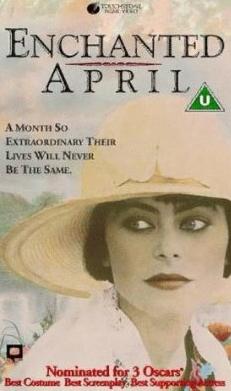
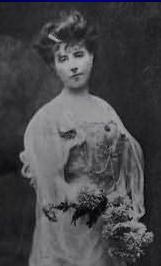

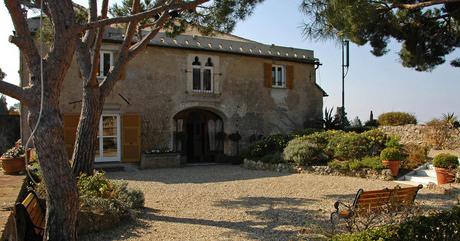
The novella, and basis
of the 1992 film of the same name, was The Enchanted April by
Elizabeth von Arnim. It is an italophile favorite, just like the
film and novella A Room with a View is, for similar reasons:
the idyllic, soul-reparative Italian setting.
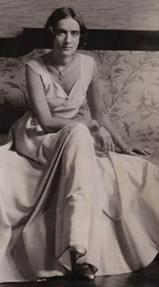
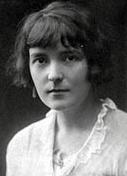
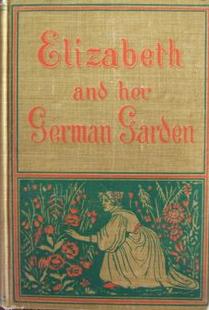
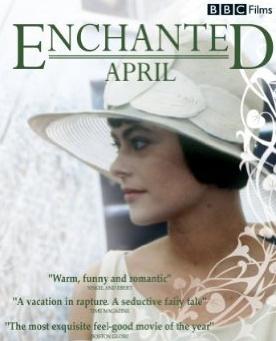
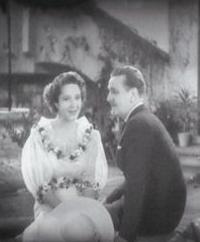
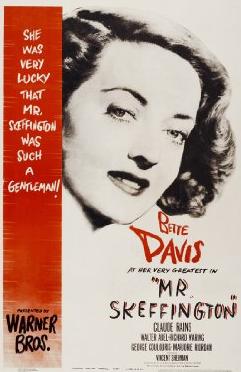
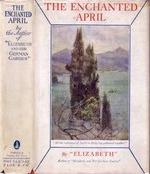
Quotes from
The Enchanted April